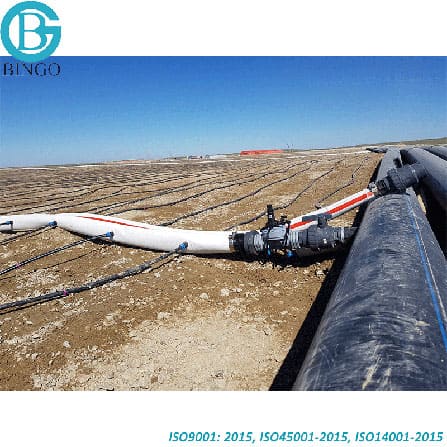Comprehending the Key Advantages of HDPE Pipeline for Water and Wastewater Administration
Making use of HDPE pipeline in water and wastewater administration provides various benefits that warrant factor to consider. Its extraordinary resilience and long lifespan make it a preferred option for lots of tasks. In addition, the product's resistance to corrosion and chemical damage enhances its dependability in various settings. Nonetheless, the advantages expand beyond just long life and resistance. Exploring its cost-effectiveness and ecological influence reveals also more engaging reasons for its prevalent fostering in modern facilities
Exceptional Resilience and Long Life

HDPE pipe stands apart for its outstanding resilience and longevity, making it a favored choice in water administration systems. Constructed from high-density polyethylene, these pipes can stand up to significant stress and stress and anxiety, guaranteeing dependable efficiency over time. Their durable nature enables them to sustain severe environmental problems, including temperature level changes and dirt movements, which can trigger various other materials to fall short.
The lifespan of HDPE pipes typically surpasses half a century, providing an economical solution for districts and markets alike. Furthermore, the material's lightweight residential or commercial properties streamline installation, reducing labor prices and durations. This sturdiness reduces the need for frequent fixings or substitutes, further improving its economic charm.
In water monitoring applications, the dependability of HDPE pipes means less disruptions and improved service connection, making them indispensable to sustainable facilities growth. The mix of toughness and longevity solidifies HDPE's function as a foundation in effective water administration options.

Resistance to Corrosion and Chemical Damages
While lots of materials succumb to rust and chemical damages gradually, HDPE pipelines display impressive resistance, making them ideal for different water monitoring applications. This durability originates from the molecular structure of high-density polyethylene, which is inherently non-reactive and does not rust like steels or break down from exposure to extreme chemicals. As an outcome, HDPE is highly efficient in settings with aggressive substances, such as wastewater systems that may include acids, bases, and natural solvents.
Furthermore, HDPE pipes can hold up against environmental aspects such as dirt level of acidity and saline problems, further improving their viability for varied applications (Texas hdpe pipe manufacturer). Their ability to maintain structural integrity in time decreases the threat of leakages and failures, which is critical in guaranteeing the security and dependability of water distribution and wastewater management systems. The resistance to rust and chemical damages markedly contributes to the total performance and durability of HDPE piping remedies.
Cost-Effectiveness and Financial Advantages
When thinking about the financial effects of water administration systems, the cost-effectiveness of HDPE pipes becomes evident. These pipelines use lower installation and upkeep costs contrasted to standard materials like steel or concrete. Their lightweight nature streamlines transportation and installation, causing minimized labor expenses. In addition, HDPE pipes exhibit a long lifespan, often exceeding half a century, which converts to less replacements and lasting cost savings.
In addition, the resistance of HDPE to deterioration and chemical damage decreases the requirement for costly repair work and substitutes. The pipes additionally support effective water flow, decreasing energy costs connected with pumping systems. By reducing leakages and water loss, HDPE pipes add to considerable financial advantages for districts and industries alike. Overall, the initial investment in HDPE piping can produce significant monetary returns over the lifespan of the water management system, making it a prudent option for sustainable infrastructure advancement.
Ecological Sustainability and Lowered Influence

Convenience and Flexibility in Installment
Because of their special buildings, HDPE pipes supply impressive adaptability and flexibility in setup, making them appropriate for a variety of applications. Their lightweight nature permits less complicated handling and transport, lowering labor prices and setup time. HDPE pipes can be curved and formed to fit various terrains and job demands, which is particularly useful in testing atmospheres.
Additionally, their resistance to corrosion and chemical damage permits for setup in diverse setups without the requirement for specialized protective finishes. The capacity to fuse joints develops a constant, leak-free system, improving the general stability and integrity of the installation. HDPE's adaptability also suits ground activity, minimizing the threat of damage in locations prone to moving soil. Overall, these characteristics make image source HDPE pipelines not only flexible yet additionally a recommended selection for water and wastewater administration systems.
Often Asked Inquiries
Exactly How Does HDPE Pipe Compare to PVC in Water Management Applications?
HDPE pipeline supplies premium flexibility, resistance to rust, and longevity compared to PVC. Its lighter weight facilitates easier setup, while its long life expectancy reduces replacement expenses, making HDPE a recommended option in water administration applications.
What Is the Lifespan of HDPE Pipes Under Typical Problems?
Under common problems, HDPE pipelines can have a life-span ranging from 50 to 100 years. Their resilience and resistance to corrosion add to their long-lasting performance in various applications, making them a dependable selection for framework.
Are HDPE Pipes Recyclable After Their Life Span?
Yes, HDPE pipelines are recyclable after their life span. hdpe pipe fittings Midland TX. They can be refined and repurposed into new products, substantially decreasing ecological impact and advertising sustainability within the sector, making them an environment-friendly choice for piping remedies
What Is the Installation Refine for HDPE Pipeline?
The setup procedure for HDPE pipes entails website prep work, trenching, pipeline fusion or mechanical signing up with, backfilling, and pressure testing. Appropriate methods assure a durable and reliable system for moving water and wastewater efficiently.
Can HDPE Pipes Be Used for Both Safe And Clean and Non-Potable Water Equipments?
Yes, HDPE pipes can be used for inch gas line both potable and non-potable water supply. Their adaptability, longevity, and resistance to deterioration make them appropriate for different applications, making certain risk-free and efficient transport of water in different contexts.